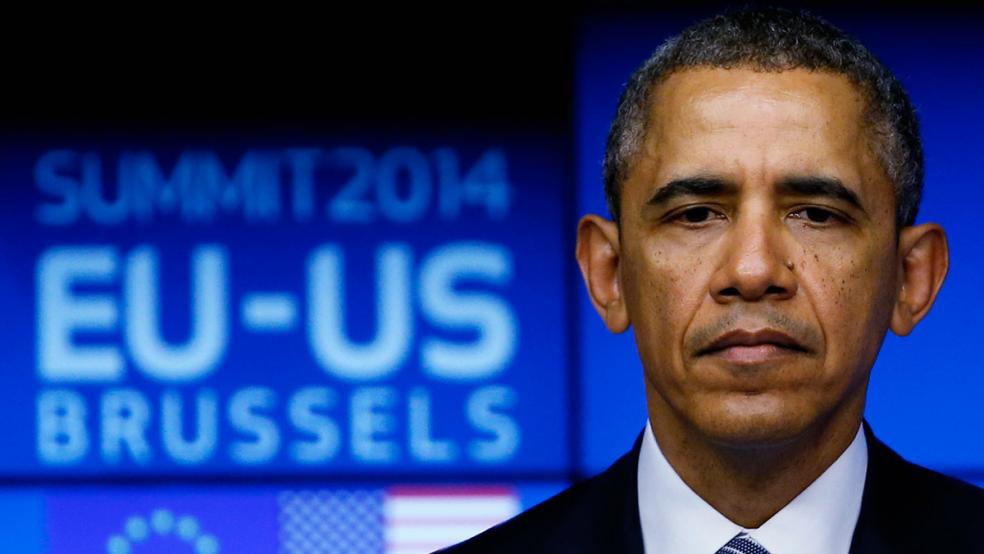In a speech that seemed more fitting for 1984 than 2014, President Obama urged America’s European allies to bolster support for NATO in the wake of Russia’s annexation of Crimea, telling European leaders that the invasion represents a “moment of testing” for the alliance.
“If we define our interests narrowly . . . we might decide to look the other way,” Obama said. “But that kind of casual indifference would ignore the lessons that are written in the cemeteries of this continent. It would allow the old way of doings things to regain a foothold in this young century. And that message would be heard — not just in Europe, but in Asia and the Americas, in Africa and the Middle East.”
Related: Why Germany and Poland Are Winners in the Ukraine Crisis
Obama did not call for military intervention in the crisis, nor did he call for NATO membership for Ukraine. However, he pledged to support Ukraine through other means and vowed to continue to isolate Russia for its actions.
“We must never forget that we are heirs to a struggle for freedom,” Obama said. “Now is not the time for bluster. The situation in Ukraine, like crises in many parts of the world, does not have easy answers, nor a military solution. But at this moment, we must meet the challenge to our ideals, to our very international order, with strength and conviction.”
Obama spoke in Brussels where NATO’s headquarters are located and thrust the alliance back onto the international stage. NATO was created during the Cold War to repel a Russian invasion of Europe but had faded in importance. In recent years, its main function has been to serve as an umbrella for international military efforts in Afghanistan.
This fading importance is reflected in European defense budgets. The alliance’s charter requires each member to contribute at least 2 percent of its budget to defense. But only three of NATO members besides the United States -- Britain, Greece and France -- meet that requirement. The vast majority of NATO’s budget - 73 percent in 2013 -- is paid for by the United States.
Related: Pressure on Putin as Russian Wealth Disappears
In the wake of the Ukraine crisis, NATO Secretary-General Anders Fogh Rasmussen has called on Europe to do more.
“The Ukraine crisis and what we have seen in Crimea has been a wake-up call and it must be followed by increased European investment in defense if we are to ensure a credible deterrence and collective defense in the future," Rasmussen said last week.
All of this begs the question -- will the United States change U.S. defense strategy and DOD’s budget priorities to reflect a resurgent Russia? For years, Obama has said that Afghanistan would mark the end of large wars involving hundreds of thousands of troops and equipment like tanks and ground transport vehicles. Instead, the United States would be involved in small wars involving drones and Special Forces.
This evolution was reflected in DOD’s budget. The size of the Army is expected to shrink. Tanks and ground transport vehicles are set to be eliminated. New investments in cyber warfare, Special Operations and drones are planned. The military is expected to do more with less.
However, Russia’s aggression, and the fact that Russian troops are reportedly amassing along Ukraine’s border, raises the prospect of a ground war in Europe. The Pentagon now needs to reconsider whether the changes built into the budget, shifting the military from a large to small war posture, should go forward.
Related: How Vladimir Putin is Remaking a New World Order
According to Gordon Adams, a defense budget expert at American University, Russia’s annexation of Crimea does not signal broader ambitions to take back former Soviet bloc states, including those in NATO. If Russia were to violate the sovereignty of a NATO member, by treaty, the alliance would have to defend it. Adams does not see Putin going that far.
“Lets get this thing in perspective. It’s a classic form of territorial activity at the near abroad on the perimeter of the country,” he said. “I don’t think we’re in a new Cold War. This is not a revival of the Soviet Union. It’s not Hitler, first Crimea then Kiev then Budapest. There’s a powerful tendency that’s hard to resist here, to reach for the historical analogy and return to ‘something.’”
However, while Adams does not see Russia as a threat to the rest of Europe, he said that he expects people on Capitol Hill and within DOD to paint it as such as an excuse to spend more on defense and protect turf.
“Those in the Army who argue a large ground war is necessary to have, for them, to use this as rhetoric, it sure sounds great,” he said. “This is going to be used as an argument not to shrink the size of the ground force.”
Related: Obama Urges US-European Unity on Helping NATO
Former Secretary of Defense Robert Gates has already made this argument. In an op-ed published Tuesday in The Wall Street Journal, Gates argued that Putin’s action demanded renewed commitment to the military.
“Western investment in Russia should be curtailed; Russia should be expelled from the G-8 and other forums that offer respect and legitimacy; the U.S. defense budget should be restored to the level proposed in the Obama administration’s 2014 budget a year ago, and the Pentagon directed to cut overhead drastically, with saved dollars going to enhanced capabilities, such as additional Navy ships; U.S. military withdrawals from Europe should be halted; and the EU should be urged to grant associate agreements with Moldova, Georgia and Ukraine,” Gates argued.
Adams said to expect similar arguments from hawks like Arizona Republican John McCain.
“Those on Capitol Hill too, who are hammering the president on defense spending, this is great rhetoric for them,” he said.
Top Reads from The Fiscal Times




